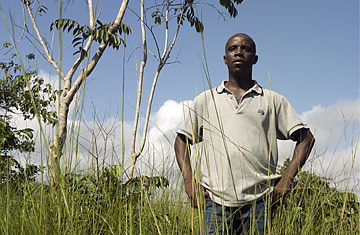
Conservation in Africa isn't just about protecting the environment. With weak rule of law and millions of people depending directly on the land, it's often about saving lives and defending those most vulnerable to economic exploitation. Which helps to explain how Liberian Silas Kpanan'Ayoung Siakor set out as a champion of fair development and ended up helping to save West Africa's biggest forest.
After distributing humanitarian supplies for the U.N. during Liberia's 1989-1996 civil war, Siakor joined a local pressure group calling for equitable development for Liberia's poorest. He helped write a newsletter, and it was during reporting trips to Liberia's destitute forest villages that he uncovered a scandal: President Charles Taylor was using logging profits to pay for his war. Siakor also discovered that logging firms were falsifying their records, as well as employing militias that beat and raped villagers and smuggled arms.
Siakor's evidence led the U.N. to ban the export of Liberian timber in 2003, and eventually helped form part of the legal case against Taylor, now on trial in the Hague on war-crimes charges for his role in the conflicts in Liberia and Sierra Leone — charges Taylor denies. In the run-up to Liberia's 2005 general election, opposition leader Ellen Johnson-Sirleaf took her cue from Siakor and adopted forest protection, along with poverty alleviation, as a key policy. Johnson-Sirleaf was duly elected President and canceled all Liberia's logging concessions. The importance of that one act to Africa's ecology is difficult to overestimate. Liberia's are the last significant virgin forests in West Africa. They cover 11.8 million acres (4.8 million ha), are home to nearly half of Africa's mammal species, and play an important role in the battle to slow climate change. If you're interested in conservation in West Africa, says Siakor, "Liberia is your first stop."
Siakor, 38, has since founded the Sustainable Development Institute of Liberia. The two-year-old NGO's mission, he says, is to look at environmental issues "from a human perspective. It's not really about greenery. It's about people whose lives have been affected by the unsustainable and destructive exploitation of resources." Siakor says it's his commitment to people that gives him his edge as an environmentalist. "The level of deprivation, the abuse, the suffering, the poverty that they were compelled to live in — I saw it all." Witnessing these hardships up close "takes a lot out of you," he says. "But it puts a lot into you too."